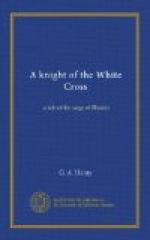Before it began Edward had sent two hundred spearmen to watch a wood near the defenders’ lines, as he thought that the Lancastrians might place a force there to take him in flank as he attacked their front. He ordered them, if they found the wood unoccupied, to join in the fight as opportunity might offer. The wood was unoccupied, and the spearmen, seeing the two divisions of their army driven backwards, and being thereby cut off from their friends, issued from the wood and, charging down in a body, fell suddenly upon Somerset’s rear.
Astounded and confused by an attack from such a quarter, and believing that it was an act of treachery by one of their own commanders, Somerset’s men, who had hitherto been fighting with the greatest bravery, fell into confusion. Edward’s quick eye soon grasped the opportunity, and rallying his troops he charged impetuously down upon the Lancastrians, seconded hotly by Gloucester and his division.
The disorder in Somerset’s lines speedily grew into a panic, and the division broke up and fled through the lanes to the right and left. Somerset, after in vain trying to stop the panic, rode furiously back into the camp, followed by his principal officers, and riding up to Lord Wenlock he cleft his head in two with a battleaxe. His resentment, although justified by the inactivity of this nobleman at such a crisis, was yet disastrous, as it left the centre without a leader, and threw it into a state of disorganization, as many must have supposed that Somerset had turned traitor and gone over to the enemy. Before any disposition could be made, Edward and Gloucester poured their forces into the camp, and the Lancastrians at once broke and fled. Many of their leaders took refuge in the church, an asylum which they deemed inviolable, and which the Lancastrians had honourably respected in their hour of triumph.
Among them were the Duke of Somerset, the Grand Prior of the Order of St. John, Sir Humphrey Audely, Sir Gervis of Clifton, Sir William Gainsby, Sir William Cary, Sir Henry Rose, Sir Thomas Tresham, and seven esquires. Margaret of Anjou fell into the hands of the victors. As to the fate of the young prince, accounts differ. Some authorities say that he was overtaken and slain on the field, but the majority related that he was captured and taken before Edward, who asked him, “What brought you to England?” On his replying boldly, “My father’s crown and mine own inheritance,” Edward struck him in the mouth with his gauntlet, and his attendants, or some say his brothers, at once despatched the youth with their swords.
The king, with Gloucester and Clarence, then went to the church at Tewkesbury, where the knights had taken refuge, burst open the doors, and entered it. A priest, bearing the holy vessels, threw himself before the king, and would not move until he promised to pardon all who had taken sanctuary there. The king then retired, and trusting in the royal word, the gentlemen made no attempt to escape, although it is said that they could easily have done so. Two days later a party of soldiers by the king’s orders broke into the church, dragged them from the foot of the altar, and beheaded them outside.




